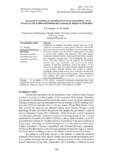| dc.contributor.author | Lusweti, Job | |
| dc.contributor.author | Okoth, Annette | |
| dc.date.accessioned | 2023-12-07T13:39:32Z | |
| dc.date.available | 2023-12-07T13:39:32Z | |
| dc.date.issued | 2023-08-31 | |
| dc.identifier.uri | https://doi.org/10.22219/mej.v7i2.28091 | |
| dc.identifier.uri | https://ejournal.umm.ac.id/index.php/MEJ/article/view/28091 | |
| dc.identifier.uri | http://ir-library.mmust.ac.ke:8080/xmlui/handle/123456789/2458 | |
| dc.description.abstract | Populations in informal settlements grapple with poor living conditions and inability to access quality education. Expenditure behaviour especially on short term basis is one of the major causes of poverty as majority live from hand to mouth and not in position to provide their children with education. This study applied canonical correlation used in a wide range of disciplines to analyse the relationship between short term expenditure and poverty levels. The main objective was to establish the relationship between short term expenditure and poverty levels among residents of informal settlements, assess the impact of this behaviour on education and propose possible mitigation strategies to the problem. Results indicate that people in informal settlements spend as much as they earn or even more on short term basis. Therefore, they cannot save for projects, invest and educate their children. This keeps the families in unending circus of poverty in all generations. | en_US |
| dc.language.iso | en | en_US |
| dc.publisher | MEJ (Mathematics Education Journal). | en_US |
| dc.subject | Canonical, Correlation, Modeling, Short, Term, Expenditure, versus, Poverty, Levels, Informal, Settlements | en_US |
| dc.title | Canonical Correlation in Modeling Short Term Expenditure versus Poverty Levels in Informal Settlements | en_US |
| dc.type | Article | en_US |

